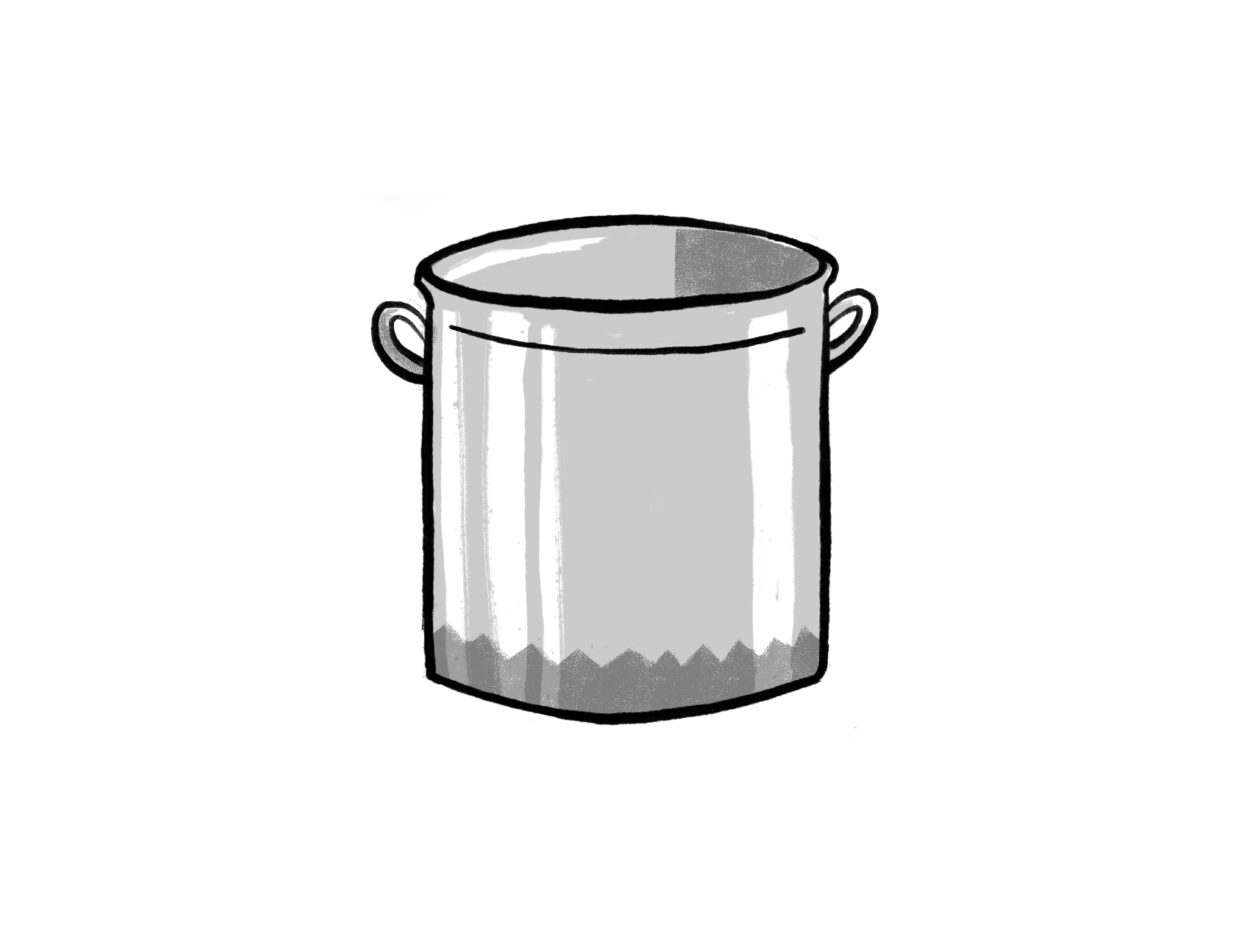
Image by Ivy Sanders Schneider

Image by Ivy Sanders Schneider
My pot is cold and empty. Outside, people stand in line with bowls in their hands, waiting for a kitchen that will not open. Children see me in the street and ask when I will cook for them again. Before the war I was a food blogger, visiting restaurants and writing reviews to showcase Gaza’s food culture. Cooking for others was not part of my life. It was only after the bombing began, when displacement and hunger spread through the camps, that I started preparing meals. At first I cooked to survive, and then I cooked for children around me, using what little aid was available. Today, from a distance, the kids call out the word that became a catchphrase in my videos: “zaki,” which means delicious. They greet me with such warmth that it cuts through my despair. They still hope that one day I will return to the kitchen.
But I have not cooked in a long time. Over the past ten months, ingredients have vanished from the markets, and most charity kitchens have closed. The silence in my kitchen is heavier than the shelling outside. It is the kind of silence that reminds you there is nothing to prepare, nothing to share, nothing to look forward to except another day of waiting.
When aid arrives, it comes in a trickle that does not cover even one percent of what we need. It is not salvation. Instead, it can be a death sentence — a trap designed to humiliate us and to remind us that our survival is left to chance. Hundreds have been killed, shot at, or crushed in the chaos while trying to collect food at the Gaza Humanitarian Foundation distribution sites. Entire families have been wiped out in minutes of desperation. Airdropped aid has killed as well: the boxes fall with such force that they can take lives instead of saving them. People run toward the boxes anyway, because hunger leaves no other choice.
I remember a different Gaza, from before starvation and fear took over. Our markets were alive with the scents of za’atar and sumac. Stalls were heavy with olives, stacks of fresh bread still warm from the oven, and baskets of green almonds glistening with morning dew. Fishermen arrived at dawn, their nets full of sardines and bream. Eggplants shone dark and fat in the sun, peppers glowed in shades of red and yellow, and piles of herbs filled the air with freshness. We marked the seasons with mangoes so sweet their perfume spread through the streets, with watermelon and salty cheese in the heat of summer, and slow-cooked stews rich in cinnamon and cardamom in winter. Sayadieh, maftool, maqluba: these were meals that were more than food. They were ways to gather and continue traditions, shared acts of caretaking carried on from one generation to the next.
That world was dismantled piece by piece. Even before October 2023, farmers saw their orchards cut down and their wells filled with rubble. Fishermen were forced from the sea under the threat of gunfire. The Israeli blockade, which began in 2007, choked off our ability to grow or easily import many foods. Lentils, pasta, tomato paste, and spices were turned away at the border. Since the genocide began, the restrictions have turned absolute: borders have been sealed and even fuel has run out. Bakery after bakery has been reduced to ash in airstrikes. This is no longer just a blockade — it is starvation used as a weapon. What disappeared was not only food, but the pride and joy of feeding others. The smells, the colors, and the sounds of the markets slipped away.
When charity kitchens could only offer plain lentils, I refused to let flavor vanish from our plates. I wanted to give people a glimpse of normal life in the middle of disaster. Every time I cooked, I thought about how much it meant for the people of Gaza to taste something that felt like home, even if only for a moment. I foraged wild khubeza when the spinach ran out. I mixed herbs together to replace what I could no longer find. I added sumac to lift a simple broth and watched a boy hold his plate close, smiling when he recognized the sourness.
Every plate I made was proof that Gaza is still Gaza, even under siege. But scarcity is a cruelty that determination alone cannot overcome. The loss is measured not only in empty stomachs but in empty marketplaces, in recipes we can no longer prepare, in flavors fading from our tongues. Hunger here is not just the absence of food. It is an attempt to erase who we are and the way we come together around a table.
I do not know when I will cook a meal again with all the ingredients it deserves. But I carry the memory of our flavors. Musakhan, knafeh, lamb stew, fish rubbed with chilis and garlic, stuffed grape leaves scented with mint. These tastes cannot be forgotten. One day, when the siege ends, my first meal will be full of everything Israel tried to take from us and could not. It will be a meal of freedom, abundance, and life. It will be the return of a Gaza that feeds both the body and the soul.
Hamada Shaqura is a Palestinian food blogger and digital marketer from Gaza. Before the war he covered the Strip’s restaurant scene. During the war he began cooking for displaced families and sharing videos that drew international attention to life under siege.